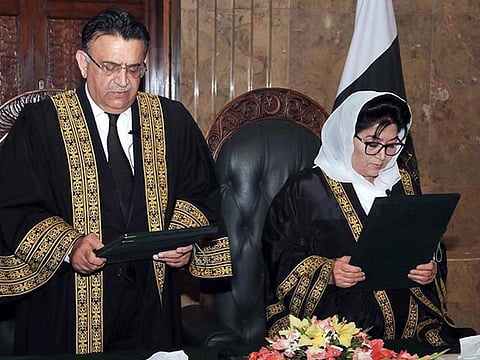Pakistan Supreme Court appoints second woman judge in country’s 75-year History
Hilali became first woman to be appointed as acting CJ of Peshawar High Court in April

Islamabad: Pakistan’s Supreme Court has achieved a momentous milestone as it welcomes its second woman judge, marking a significant leap forward in the country’s 75-year history.
Justice Musarrat Hilali was sworn in as a judge of the Supreme Court of Pakistan on July 7, becoming the second woman judge in history to be elevated to the apex court. She became the first woman to be appointed as the acting chief justice of the Peshawar High Court in April this year.
During a ceremony at the ceremonial hall of the apex court in Islamabad, Pakistan’s Chief Justice Umar Ata Bandial administered the oath to Justice Hilali.
Following Justice Hilali’s elevation, the number of top court judges rose to 16 out of a total strength of 17.
President Dr. Arif Alvi granted approval for Justice Hilali’s appointment to the apex court on July 5.
Moment of pride for legal fraternity
“This momentous occasion marks a significant milestone as Justice Hilali becomes not only the second female Supreme Court judge but also the first female judge from Khyber Pakhtunkhwa” province, said AGHS, the law of firm of prominent Pakistani lawyer Asma Jahangir.
The Human Rights Commission of Pakistan (HRCP) welcomed the appointment of Justice Hilali, stating that “This is an important step towards improving gender diversity in the judiciary, although there is still a long way to go”.
Last year in January, Justice Ayesha Malik became the first female judge of the Supreme Court in the country’s history.
With the addition of another highly accomplished female jurist to the esteemed bench, the Supreme Court sets a powerful precedent for a more inclusive and representative legal landscape.
The appointment marks a significant step towards improving gender diversity in the judiciary in a country where women reportedly account for only 17 per cent of judges overall and just under 4.4 per cent in the high courts.
“A more gender-diverse judiciary will have far-reaching effects on people’s access to justice and the quality of justice” according to the HRCP statement. The organization stressed that increasing women’s representation on the bench has been shown to improve accessibility for vulnerable groups, enhancing public confidence in the judiciary.
Justice Hilali, a prominent rights activist
Before her appointment to the Supreme Court, Justice Hilali served for a decade as the first woman chief justice of the Peshawar High Court. Justice Hilali has a long and distinguished career in law. Born in Peshawar in August 1961, she received her law degree from Khyber Law College of the University of Peshawar. She became an advocate of district courts in 1983 and of the high court in 1988. She was later appointed as an advocate of the Supreme Court of Pakistan in 2006. She is a prominent human rights activist, serving as a member and leader of the HRCP, including heading its KP chapter. Justice Hilali has also been a pioneer in promoting women’s rights in Pakistan’s legal system. She was the first woman elected office-bearer on the post of secretary at the bar, the first female additional advocate general of Khyber Pakhtunkhwa (KP), and the first woman chairperson of the KP Environmental Protection Tribunal. In 2011, she was appointed the first woman ombudsperson for protection against the harassment of women in the workplace.
Sign up for the Daily Briefing
Get the latest news and updates straight to your inbox



